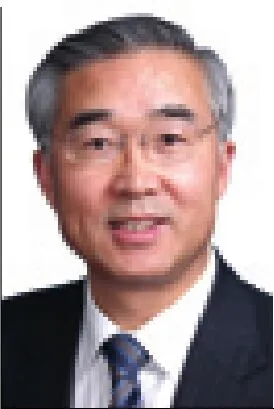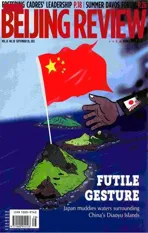Success Relieson Win-Win Cooperation
2012-10-14TangGuoqiang
Success Relieson Win-Win Cooperation
By Tang Guoqiang

The 20th APEC Econom ic Leaders’ Meeting yields fruitful results The author is chairm an of the China National Comm ittee for Pacific Econom ic Cooperation
T he 20th Economic Leaders’ Meeting of the Asia-Pacific Economic Cooperation(APEC) forum w rapped up on September 9 in Russia’s Far Eastern city of Vladivostok. With a theme entitled, “integrate to grow, innovate to prosper,” economic leaders and representatives actively exchanged views on a w ide range of issues, including trade and investment liberalization, regional economic integration, strengthening food security and establishing reliable supply chains, as well as cooperation to foster innovative grow th.
Currently, the world economy is still in a slow recovery and some destabilizing factors and uncertainties remain. As a whole, the Asia Pacific maintains sound grow th momentum,but the region should not overlook the impact brought about by the grave challenges facing the global economy. The regional cooperation and economic development of the Asia-Pacific region have been confronted with complicated new issues. Against the current backdrop, as the most prominent regional economic cooperation organization of the Asia Pacific, the achievements of the APEC Economic Leaders’ Meeting this year aroused wide interest.
Broad consensus
The meeting proved to be successful after achieving a series of important agreements.A ll sides agreed to strengthen the grain market infrastructure, promote agricultural investment, enhance food security and improve access to food for vulnerable groups.
Under a Russian initiative, many agreements were reached on a more systematic approach to addressing existing chokepoints in supply chains through targeted capacitybuilding and concrete steps toward making supply chains more reliable, resilient, safe, efficient, transparent, diversified and intelligent.
The APEC economies also reached consensus on establishing an APEC technology p latform, strengthening higher education cooperation among APEC members, as well as promoting small, medium and m icro-sized enterprises for innovation-driven grow th.
The free trade of environmental goods is of great positive significance for promoting green grow th and free trade w ithin the region.Meanwhile, it is to the benefit of all regional economies. Based on the consensus reached at the Honolulu meeting in 2011, this year the APEC econom ies made great progress via in-depth discussions on APEC’s list of environmental goods. In the Vladivostok meeting, they endorsed a list of 54 items of environmental goods—primarily low-carbon, energy-saving green products—and agreed to reduce tariffs to 5 percent or less by the end of 2015. The endorsement is one of the most important milestones of APEC in the field of trade and investment liberalization.
APEC shou ld con tinue to take a firm stand against a ll k ind s o f trade p ro tec tion ism, sa fegua rd a free and fair w o rld trad e system and p lay a m o re ac tive ro le in w o rld trade d eve lopm en t
China has kept a sincere and positive attitude in its approach to the environmental goods list and consulted with other members in a constructive spirit. Of the items on the list, 54 percent were proposed by China. During this process,China took full consideration of the interests of developing countries and aimed to ensure that those countries have access to environmental products w ithout being affected by green barriers. China insists that when promoting the liberalization of environmental products, APEC members’ different development stages and practical conditions should be taken into account.A lso, it calls on developed members to assist developing members in enhancing their capability of developing green industries and achieving sustainable development.
There are several reasons why APEC members made much progress despite a gloomy world economy. The forum has put itself on the right side of history by helping promote econom ic development, improve people’s lives and boost the prosperity of the Asia-Pacific region. Cooperation in these areas is the prime directive of APEC since it was established in 1989, and the essential purpose of all previous APEC leaders’ meetings.

APEC fully respects the reality that the Asia-Pacific is a diversified and mutually dependent region. It pursues a pragmatic and flexible cooperation approach based on consensus in adherence to the principle of seeking commonalities while reserving differences.
APEC respects differences and handles disagreements among members appropriately.It tries to promote regional economic integration at different levels, in various scopes and through multiple channels, and has explored an efficient path for deepening economic cooperation among countries w ith diverse national conditions, varying development stages and different cultural backgrounds. Moreover, it has also developed a fairly sophisticated institutional framework and self-correcting reform mechanism.
China has always attached great importance to the role of APEC and made its own positive contributions to the development of the organization with its active participation. This year China has attended more than 10 APEC ministerial conferences and about 100 other meetings and activities of the organization. It also hosted more than 20 APEC related meetings, seminars and training workshops.
At present, the international financial crisis has not yet been resolved. Some countries are still m ired in sovereign debt problems.The employment situation is not very optimistic while food security issues are becoming more prom inent. International trade grow th is falling noticeably while the difficulty of macroeconomic policy coordination in most countries is on the rise. In the meantime, protectionism is sprouting up and the downside risks of the global economy are increasing.
Under the circumstances, APEC members have agreed that boosting grow th, promoting stability and pursuing development should still be the primary tasks of countries in the region.All parties should cherish and further strengthen the hard-won grow th of the world economy and promote regional cooperation trying to drive the Asia-Pacific economy to achieve robust, sustainable and balanced grow th.
Positive sign ificance
Most APEC members claim that the region should stick to the Bogor Goals put forward in 1994, which require developed APEC members and developing members to achieve trade and investment liberalization in 2010 and 2020 respectively. As the multilateral trading system is faced w ith severe challenges, APEC members should revive the Bogor Goals, advance the trade and investment liberalization process centering on those objectives and inject impetus to economic recovery and sustainable development.
The world economy may remain in the doldrums for an extended period of time.Protectionism has intensified in some of the APEC member econom ies, causing problems for their trade partners. APEC should continue to take a fi rm stand against all kinds of trade protectionism, safeguard a free and fair world trade system and play a more active role in world trade development.
Du ring the V lad ivostok m eeting,Chinese President Hu Jintao announced that China w ill host the APEC Econom ic Leaders’ Meeting in 2014. In 2001, China hosted the Ninth APEC Econom ic Leaders’M eeting in Shanghai, which made great progress in promoting the development of a multilateral trading system, human resources capacity building and cooperation in antiterrorism. It also came to a Shanghai consensus aim ing to ramp up efforts to achieve the Bogor Goals. China’s hosting of the 2014 APEC Econom ic Leaders’ Meeting w ill once again highlight its w illingness to promote regional cooperation.
A fter 20 years of development, APEC members are faced w ith both opportunities and challenges. While member econom ies have w itnessed steady econom ic grow th w ith great development potential on account of gradually opening markets, unbalanced economic grow th among member econom ies has hindered the development of the organization as a whole. Therefore, we need to exploit new approaches to further promoting regional economic cooperation w ithin the framework of APEC.
As the world’s second largest economy and a representative of emerging econom ies, China w ill continue to provide good opportunities for the development of the Asia-Pacific region w ith its own econom ic grow th. China hopes fellow members w ill continue to participate in its reform, opening up and modernization drive. China w ill take the 2014 APEC Econom ic Leaders’Meeting as an opportunity to promote mutually beneficial collaboration in the region,aim ing to push Asia-Pacifi c econom ic cooperation to a new height.
